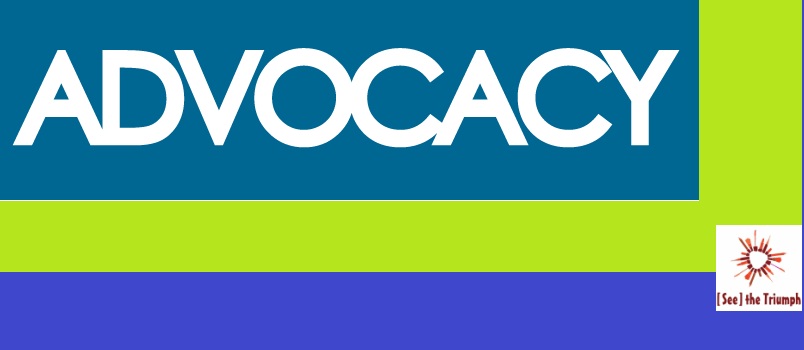|
7/13/2014 What Does Advocacy Mean to Me?By Allison Crowe, See the Triumph co-founder
When Christine and I started the See the Triumph project, we knew we wanted to share the stories we’d heard from survivors in our research. We had interviewed a small number of women and were touched by the poignant experiences, messages to other survivors, horror stories of abuse, and ways the women we met had managed to overcome abusive relationships. This was about three years ago, but I remember our phone call after we’d completed the interviews– both of us seemed to know we wanted to do something more than the traditional, scholarly writing about the research, but how exactly this would look we really didn’t know! One of our first ideas was to create a website to reach a broader audience. We had quotes from the interviews that might work well displayed with pictures and images. Now, we had to make sure that both of our institutional review boards (IRBs) would approve of sharing our research in this way. As the project grew, so did out knowledge of social media, and tools that are available for sharing information and reaching a broader audience. Honestly, when we started, Christine and I did not know much about social media tools, blogging, pledges and petitions, and how to be advocates of a project like this. Each See the Triumph milestone has been a learning experience, but along the way, one of my biggest take-away’s has been proudly adding the identity of advocate to my role as a university professor. And I have to say, it has been one of the most rewarding identities to claim. I remember learning about the role of advocacy during my master’s program in counseling and feeling intimated about how to advocate, what this would look like in practice, and finding time for this in addition to the other responsibilities of a professional counselor. Today, I want to share some of my own small lessons learned about advocacy through the See the Triumph project. My hope is that by reading some of these, you might think about them as they apply to your own passions and identities as advocates: 1. Own your strengths. When we started this project, Christine and I knew how to do research and write for publication. We used these strengths to develop material that later we edited and transformed so that it could be used in a different way on social media. We did not lose sight of what we already knew how to do, and used these skills as a starting point. So, for those of you thinking of beginning a project, campaign, or advocacy endeavor, consider what you naturally do well, and start there! 2. Acknowledge your weaknesses. Early on, Christine and I had the great pleasure of meeting with Andrew Willis, Executive Director and Founder of the Stop Abuse Campaign. Boy, did he help us learn the ropes for building a website, starting a Facebook page, and a growing a Causes following. He was patient, honest, and helped us understand the differences between academic writing and writing as an advocate for change. 3. Collaborate. An early lesson Christine and I learned is that we couldn’t do this alone. We needed guest bloggers, students, and volunteers to help us with anything and everything on the project. For anyone wanting to advocate for an issue, give voice for those who need strength, or fight for social justice issues, there really is strength in numbers! Find others out there who are doing similar work and see if they might be willing to work with you in small or large ways. 4. Find people you work well with. I have found that my most successful projects have been those where my style of working matched those working styles of the people I was collaborating with. Now, this is not to say that different ways of working can be productive on an advocacy project, but for me, a valuable take-away from the See the Triumph project has been that as co-founders, Christine and I work well together and have similar approaches. When you begin a large advocacy endeavor, chances are you’ll be spending a decent amount of time on it, so for me this has been a very important aspect of the project and a large part of our success. 5. Have fun! Chances are, if you are advocating for a topic, population, or issue that needs advocating for, it is a serious and perhaps upsetting/unfair topic that can feel draining for all those involved. Serious issues that feel like uphill battles can lead to burn out, exhaustion, or feelings of defeat. At See the Triumph we have found ways to promote stories of triumph, uplifting messages, and manage to have some fun along the way, even if it’s just for our own sanity. So, as much as being an advocate demands seriousness and commitment to the issue, it also requires that you take time off, detach for a while, and return feeling refreshed and renewed. These are five simple reflections from my own journey with See the Triumph. My hope is that they might help those of you along the way in your paths towards advocacy. Thanks for reading, and as always, thanks for supporting our work! Comments are closed.
|
Archives
July 2024
CategoriesAll About Intimate Partner Violence About Intimate Partner Violence Advocacy Ambassadors Children Churches College Campuses Cultural Issues Domestic Violence Awareness Month Financial Recovery How To Help A Friend Human Rights Human-rights Immigrants International Media Overcoming Past Abuse Overcoming-past-abuse Parenting Prevention Resources For Survivors Safe Relationships Following Abuse Schools Selfcare Self-care Sexual Assault Sexuality Social Justice Social-justice Stigma Supporting Survivors Survivor Quotes Survivor-quotes Survivor Stories Teen Dating Violence Trafficking Transformative-approaches |
Search by typing & pressing enter



 RSS Feed
RSS Feed